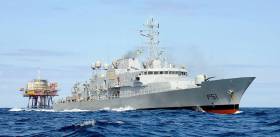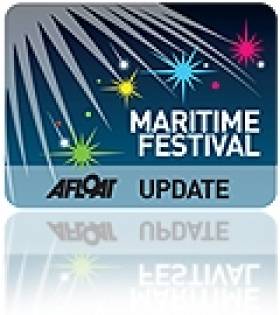Displaying items by tag: August Bank Holiday
LÉ Róisín Open to the Public This August Bank Holiday Weekend at Rathmullan Co. Donegal
#NavalService - L.E. Róisín, leadship of a pair of 'Róisín' or OPV80 class offshore patrol vessels will be open to the public in Co. Donegal this August Bank Holiday weekend.
The OPV is berthed at Rathmullan Pier, Lough Swilly where Naval Service crew yesterday provided guided tours of the 80m OPV. Further tours will be made available between 13:30 - 17:00 today and during tomorrow's Bank Holiday Monday.
Afloat had previously monitored L.É. Róisín during the annual Zeebrugge Navy Days, where foreign navies join those of their host, the Belgian Navy which has a base location within the commercial port that includes a ferry service to Hull in the UK. The three day event took place in late June early July in which public tours of the Irish Naval Service OPV took place.
L.É. Róisín was built by Appledore Shipyards, Bideford in the UK and was commissioned into service in December 1999. The same yard located in north Devon is now under different owners, Babcock Marine which is currently at the final stages of completing the newbuild OPV90 L.É. George Bernard Shaw, an enhanced version of the L.É. Róisín.
As for the construction of L.É. Róisín, Naval Service engineers stood by at all stages of the build.
The OPV80 class was built to a design that optimises patrol performance in Irish waters (which are the roughest in the world), all year round. For that reason a greater length overall (78.8m) was chosen, giving her a long sleek appearance and allowing the opportunity to improve the conditions onboard for her crew.
On board facilities include more private accommodation, a gymnasium and changing /storage areas for boarding teams.
Stormy Stan Sails In For Arklow's Gathering of the Fleet
#MaritimeFestivals - Stormy Stan sailed into Arklow aboard tall ship Ruth recently as part of the build up to Arklow RNLI’s Gathering of the Fleet Maritime Festival.
This August Bank Holiday weekend, Arklow RNLI and Arklow Harbour will play host to vessels of all shapes and sizes from tall ships such as Ruth to Naval Service vessels, vintage and prototype RNLI lifeboats, emergency service vessels and visiting boats from all around the UK, Ireland and further afield for the fundraising festival, which is now over 50 years old and continues to go from strength to strength.
Boat trips, kayaking and windsurfing opportunities will be up for grabs, as well as the special attraction of the Thundercat Experience, where visitors can head out on the water aboard a Thundercat racing boat.
There will be aerial attractions too, with a flying visit by the Garda Air Support Unit and the regular Air Sea Rescue Display with the Irish Coast Guard's Rescue 117 helicopter.
And that's not to mention the activities or landlubbers such as the carnival, food and craft stalls, live music, model boats, emergency service demonstrations and vintage vehicles.
Arklow RNLI volunteer lifeboat press officer Mark Corcoran said: "This weekend really is a must for maritime enthusiasts and all the family. Almost all of the events are free. This is our opportunity to put something back in our town.
"Without our communities continued support we couldn’t continue, so make sure to come down to Arklow this August Bank Holiday weekend for the Gathering of the Fleet-Arklow Maritime Festival."
He added: "There really is something for everybody, so put it in the calendar."
Full details of the festival will be available on the festival's Facebook page, where anyone with a vessel who wants to take part in the festival can make contact. There is also an opportunity for any novice or experienced sailors to arrive at the festival aboard a tall ship – e-mail [email protected] for further details.





























































